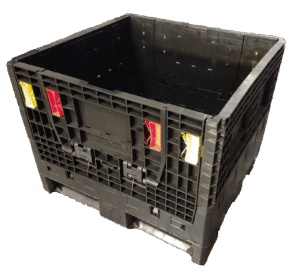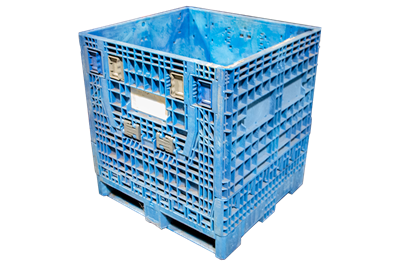The importance of used plastic containers in sustainable material handling
Wiki Article
The Ultimate Guide to Choosing the Right Bulk Containers for Your Company Demands
Selecting the appropriate mass containers is critical for any kind of company that depends on effective logistics. Various kinds of containers exist, each made for particular products and applications. Variables such as size, product compatibility, and governing standards play a significant duty in this decision-making procedure. Recognizing these aspects can cause enhanced functional effectiveness. Nonetheless, numerous services neglect essential facets that can improve their general performance and sustainability. What are these factors to consider?Comprehending Various Types of Bulk Containers
Mass containers function as important devices for organizations looking for effective storage and transportation remedies. These containers are available in different types, each developed to meet specific functional needs. One typical type is the intermediate mass container (IBC), which is perfect for granulated and fluid products, using an equilibrium of capability and ability to move. Another popular alternative is the mass bag, or FIBC, ideal for completely dry, flowable products. These flexible containers are light-weight and can be easily delivered and kept. For much heavier materials, stiff bulk containers are often utilized, providing sturdiness and security for secure handling. In addition, there are customized containers customized for dangerous materials, making certain conformity with security policies. Comprehending the unique qualities of these mass container kinds allows companies to make enlightened decisions that optimize logistics and lower prices. By picking the appropriate container, companies can boost their operational efficiency and simplify their supply chain processes.Secret Product Factors To Consider for Bulk Containers
When picking mass containers, it is important to consider the materials made use of in their construction. Elements such as chemical, longevity, and strength compatibility play a vital duty in guaranteeing the containers meet details functional demands. Furthermore, weight and portability issues can influence both effectiveness and transport logistics.Material Durability and Stamina
Toughness and toughness are essential consider picking materials for mass containers, as they directly affect the container's ability to withstand various environmental problems and handling procedures. Materials such as high-density polyethylene (HDPE), polypropylene, and stainless steel are commonly preferred for their robust buildings, providing resistance to temperature, impact, and abrasion variations. The choice of material likewise impacts the total lifespan of the container; stronger materials typically cause much less frequent substitutes, bring about cost financial savings over time. Additionally, the weight of the product can impact shipping costs and ease of handling. Companies should consider their specific operational settings and the potential for wear and tear to guarantee peak resilience and toughness in their bulk container selection.Chemical Compatibility Factors
Recognizing chemical compatibility is vital for choosing mass containers, as the materials made use of need to resist the particular substances they will hold. Various variables affect compatibility, consisting of the chemical nature of the materials, temperature, and duration of storage space. Harsh chemicals might require containers made from stainless steel or specialized plastics that withstand destruction. Additionally, reactive materials can produce warm or gases, necessitating vented or pressure-rated containers. The selection of container material, whether polycarbonate, polyethylene, or metal, should align with the chemical homes of the stored compounds to avoid leakages or violations. Ultimately, a detailed evaluation of these compatibility variables ensures secure handling and storage, safeguarding both workers and the atmosphere while keeping product integrity.Weight and Transportability Problems
Selecting mass containers involves not just evaluating chemical compatibility yet likewise thinking about weight and portability. Businesses must assess the convenience of handling and transportation to enhance efficiency. Light-weight products like high-density polyethylene (HDPE) or light weight aluminum can assist in much easier motion and decrease shipping prices. Alternatively, much heavier containers might give enhanced longevity however can impede wheelchair, particularly in atmospheres needing constant relocation. In addition, the design of the container should enable for practical training and stacking, ensuring ergonomic security for workers. Companies should additionally think about the infrastructure available for transport; as an example, containers compatible with forklifts or pallet jacks can improve procedures. Ultimately, the best equilibrium in between weight and transportability directly affects functional effectiveness and expense performance.Sizing Your Mass Containers for Optimum Performance
When sizing bulk containers, organizations should carefully evaluate the dimensions required to accommodate their particular products. Additionally, weight capability is an essential element that influences effectiveness and security throughout transport and storage space. Reliable sizing not just maximizes space however also maximizes operational operations.Establishing Container Dimensions
Choosing the ideal dimensions for mass containers is crucial for maximizing effectiveness in storage and transport. Organizations have to evaluate their specific requirements, considering factors such as offered space, the nature of the goods being saved, and the methods of transport utilized. Exact measurements assure that containers fit ideally in cars and storehouses, reducing thrown away area and reducing taking care of time. Standard sizes can use ease, but customized dimensions could be required for special needs or to accommodate particular items. Furthermore, it is necessary to evaluate piling capabilities and accessibility, as these elements influence total operational efficiency. Ultimately, the right dimensions lead to improved organization and structured logistics, benefiting the overall efficiency of the service.Weight Ability Considerations
Understanding weight capacity is crucial for businesses intending to maximize their bulk container performance. The weight ability of a container directly influences storage abilities, transport logistics, and general functional costs. Selecting containers with the appropriate weight limitations ensures that services can securely store and carry their items without risking damage or compliance issues. Overwhelming containers can result in architectural failures, while underutilizing capacity lead to lost sources. It is essential for organizations to analyze their product weights and take into consideration any regulative requirements when picking containers. Additionally, variables such as the sort of material, intended use, and environmental problems ought to also influence weight capability decisions. By assessing these elements, services can improve efficiency and ensure a streamlined supply chain.Regulatory Compliance and Safety Requirements

Governing conformity and security requirements play a vital role in the selection of bulk containers for companies. Organizations has to assure that their containers fulfill numerous laws set by neighborhood, national, and worldwide authorities. These criteria usually refer to product safety and security, structural stability, and proper labeling, which help avoid mishaps and ensure the secure transportation of products.
Additionally, adherence to industry-specific standards, such as those from the Fda (FDA) or the Occupational Security and Health And Wellness Administration (OSHA), is essential for business handling dangerous products or food. Non-compliance can result in fines, lawful concerns, or damages to an organization's track record.
Organizations must likewise think about the container's compatibility with the materials being stored or carried to prevent contamination or chain reaction (used bulk containers). To sum up, recognizing and carrying out regulative conformity and safety and security requirements is crucial for the efficient and liable use mass containers
Sustainability Alternatives for Eco-Friendly Mass Containers

Business are also exploring choices made from recycled products, which not just save resources but also sustain the reusing market. Furthermore, innovations in layout permit for lighter containers that call for much less energy to transportation, further boosting sustainability. By incorporating these environmentally friendly bulk container alternatives, organizations can show their commitment to ecological stewardship while satisfying consumer demand for lasting methods. This change not just assists the world however can likewise improve brand track record and client commitment.
Cost-Effectiveness and Budgeting for Mass Containers
While lots of businesses concentrate on sustainability, cost-effectiveness remains a crucial variable when choosing mass containers. Organizations must examine the initial acquisition cost, in addition to lasting operational expenses, to guarantee financial feasibility. Variables such as maintenance, reusability, and longevity play a substantial function in figuring out total costs.Spending in high-quality containers may yield higher in advance expenses yet can lead to savings with lowered substitute prices and lowered waste. Additionally, companies should think about transport prices and storage space performance, as these can influence the total budget plan.

Regularly Asked Inquiries
Just how Do I Figure Out the Right Container for Hazardous Materials?
To determine the right container for unsafe materials, one should review compatibility with the material, consider the container's material, look for governing conformity, and examine ability and safety and security features to ensure correct handling and storage.Can Bulk Containers Be Personalized for Particular Products?
Yes, bulk containers can be personalized for particular products. used plastic containers. Different attributes, such as material, layout, and dimension, can be customized to satisfy special demands, making certain suitable security and effectiveness for carrying and saving various goodsWhat Is the Ordinary Lifespan of Different Bulk Container Kind?
The ordinary life-span of bulk container types varies; plastic containers last 5-10 years, steel containers 10-20 years, and wood containers generally last 3-7 years, depending on usage, upkeep, and environmental problems.Exactly how Should I Clean and Maintain Mass Containers?
To clean and keep bulk containers, one must frequently check for damages, eliminate deposit, laundry with ideal cleaning agents, rinse thoroughly, and warranty proper drying prior to storage space. Adhering to manufacturer guidelines enhances longevity and safety and security throughout usage.Are There Rental Alternatives for Mass Containers Available?
Yes, countless firms offer rental alternatives for bulk containers, offering adaptability for companies. These rentals can fit numerous demands, allowing companies to take care of supply successfully without the dedication of acquiring containers outright.Toughness and toughness are vital aspects in picking materials for bulk containers, as they straight affect the container's ability to stand up to numerous ecological conditions and taking care of processes. Comprehending chemical compatibility is crucial for choosing mass containers, as the products used must withstand the specific materials they will certainly hold. Understanding weight capability is crucial for businesses aiming to maximize their mass container efficiency. Regulative conformity and safety requirements play an essential role in the option of mass containers for companies. While lots of businesses focus on sustainability, cost-effectiveness continues to be an important variable when selecting bulk containers.
Report this wiki page